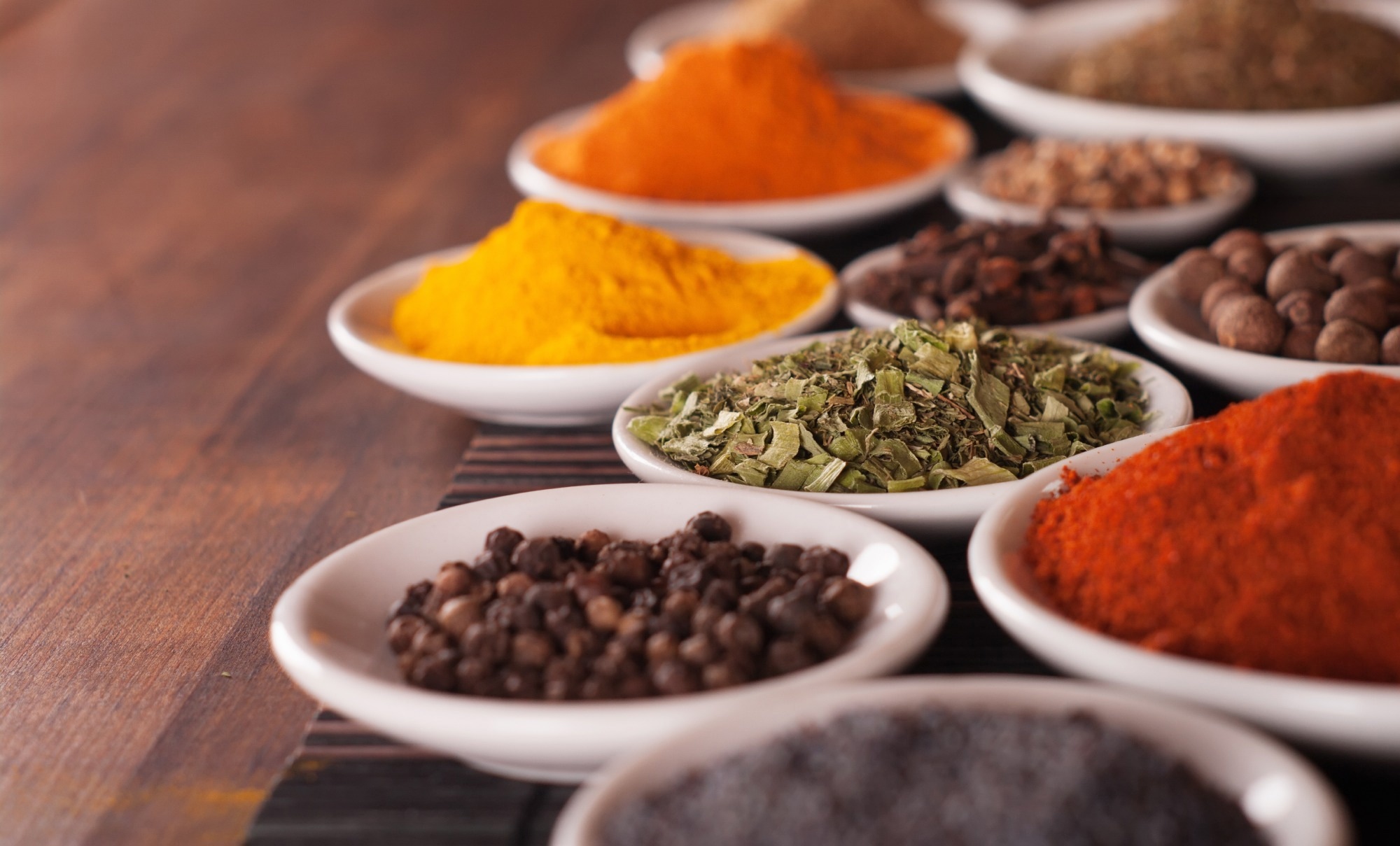Spicing up diabetes management: Mediterranean diet’s aromatic herbs lower blood sugar
In a recent study published in the journal Nutrients, researchers from Spain investigated the influence of aromatic herbs and spices in the Mediterranean diet (MedDiet) on the glycemic profiles of patients with type 2 diabetes mellitus (T2DM). They found that black cumin, cinnamon, ginger, curcumin, and saffron significantly lowered fasting blood glucose levels. Further, they found that black cumin and ginger significantly improved glycated hemoglobin (HbA1c) levels in T2DM patients, while cinnamon and ginger significantly lowered insulin concentration.
Review: Changes in food preferences and ingestive behaviors after glucagon-like peptide-1 analog treatment: techniques and opportunities. Image Credit: aboikis / Shutterstock
Background
T2DM is a critical healthcare concern, affecting 460 million people globally. Its prevalence has surged in the past four decades, contributing to three or more comorbidities in 60% of patients ten years after diagnosis and causing 6.7 million annual deaths. Various risk factors, including genetics, metabolism, and the environment, influence the disease. While non-modifiable factors like ethnicity and family history play a role, addressing the modifiable risk factors such as lack of physical activity, obesity, and an unhealthy diet can potentially prevent T2DM. Dietary guidance is essential for improving patients’ lifespan and quality of life.
MedDiet emphasizes high consumption of extra-virgin olive oil, low-glycemic-index carbohydrates, and moderate fish, poultry, and dairy intake. Additionally, it limits the intake of red meat and alcohol. Evidence suggests that MedDiet can positively impact metabolic syndrome and T2DM, as demonstrated by lowered diabetes risk and improved glycemic profiles. The diet incorporates various aromatic herbs and spices, such as black cumin, clove, parsley, saffron, thyme, ginger, black pepper, rosemary, turmeric, basil, oregano, and cinnamon, known for potential health benefits, including antitumor, antioxidative, anti-inflammatory, and cholesterol-lowering properties. Therefore, researchers in the present study aimed to examine the effect of all these aromatic spices and herbs on the glycemic profiles of T2DM subjects.
About the study
For the present systematic review and meta-analysis, databases including Web of Science, PubMed, and Scopus to identify peer-reviewed articles and interventional studies. Case studies, commentaries, letters, conference papers, narrative reviews, and studies not conducted in humans or those involving children were excluded. The systematic review included 77 studies, while the meta-analysis included 45 studies (3050 participants).
The studies involved varying dosages of the spices and herbs and assessed their effect on glycemic profiles. The primary outcomes included fasting glucose, insulin, and HbA1c alterations, while secondary outcomes included variations in body weight and body mass index (BMI). Statistical analysis involved the determination of changes in means and standard deviation and the use of Cochrane Q and Higgins I2 tests. The risk of publication bias was assessed using Egger plots. The quality of the included trials was assessed using the methodology described by Kmet et al.
Results and discussion
Cinnamon supplementation significantly reduced fasting glucose in six out of eleven studies. The meta-analysis indicated a reduction of 18.67 mg/dL compared to placebo, but the difference was not statistically significant in considering predictive value. Curcumin supplementation in seven studies showed a significant reduction in fasting glucose (p < 0.001) compared to placebo, with a significant difference including predictive value. Ginger supplementation in ten studies demonstrated a reduction in fasting glucose (17.12 mg/dL, p = 0.0004) compared to placebo, with no significant difference, including predictive value. Black cumin supplementation in eight studies resulted in a significant reduction in fasting glucose (p = 0.0001) compared to placebo, with no significant difference in considering predictive value. Using saffron supplementation resulted in substantially lowering glucose, an effect more pronounced when combined with physical activity. Overall, black cumin demonstrated the most substantial reduction in fasting glucose, followed by cinnamon and ginger.
Further, only ginger and black cumin exhibited a significant improvement in HbA1c, and cinnamon and ginger significantly decreased insulin levels. Among the analyzed aromatic herbs and spices in the MedDiet, ginger stood out as the sole contributor to significant decreases in all three examined outcomes: HbA1c, fasting glucose, and insulin level.
The quality of studies selected for the review (mean score 0.54) was lower than the quality of studies selected for the meta-analysis (mean score 0.68). Despite the large scale of the study, the findings are limited by the lack of consideration of body weight and lifestyle changes affecting fasting glucose levels, alongside challenges posed by varying study quality, inadequate statistical analyses, and the absence of standardized herb dosage information.
Conclusion
In conclusion, the present study could identify the potential therapeutic benefits of various aromatic herbs and spices in MedDiet for diabetes management. Further research is needed to determine optimal dosages and assess the impact of active components of the herbs and spices, facilitating their application in targeted interventions for glycemic control in T2DM patients.
- Effect of Aromatic Herbs and Spices Present in the Mediterranean Diet on the Glycemic Profile in Type 2 Diabetes Subjects: A Systematic Review and Meta-Analysis. Garza MC et al., Nutrients, 16(6):756 (2024), DOI: 10.3390/nu16060756, https://www.mdpi.com/2072-6643/16/6/756


